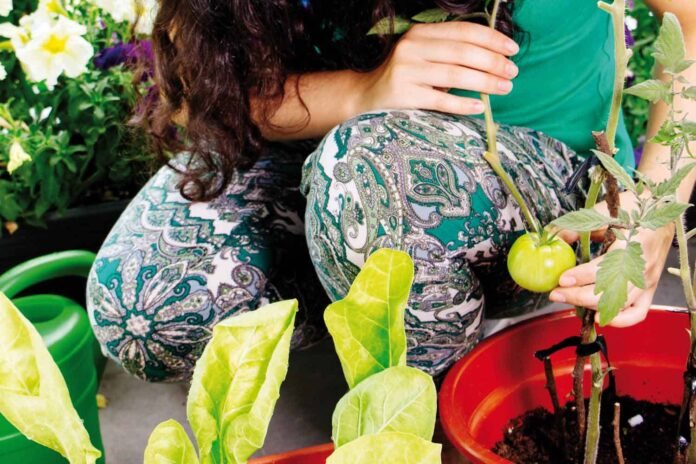We are tired of eating the kind of food which has been proven to be laced with the toxic chemicals. Aren’t we? But luckily we don’t have to foster them anymore because there are better available methods which are much safer and toxin-free.
The concept is called organic farming, and food, organic food. When we focus on eating organic, we stay away from a whole lot of harmful chemicals present in our diet. Farming involves growing food without any influence of these chemicals.
As people tend to grow health-conscious, the ongoing trend in the market also has gained a lot of popularity amongst all. Everyone wants to go organic and stay healthy.
Besides buying the organic fruits, vegetables from the market, how can we grow it in the comfort of your house? Let’s find out below.
Benefits of growing organic food
The demand for organic food is increasing every day, due to the obvious good it has to offer. But, let’s face the fact, the demand is way more as compared to the supply. Unfortunately, organic food is not easy to reach.
There are special farmer’s markets where you have to visit stock up your pantry with the goodness. Also, sadly you cannot keep much amount of stuff in your house as the foods are easily perishable (no preservatives).
Also, organic foods cost you a little above the prices of your conventional food. So, wouldn’t it be better if we could grow it on our own?
It would make it easy to reach healthy food, you literally can watch your food grown in front of your eyes, nurture them by your hands and eat them right away. Now that’s the most impressive farm-to-plate ever.
Organic farming is healthy for us and the environment, fun to learn and it adds one more feather in the hat of your skills. So why not?
“There will come a time when only those who know how to plant will be eating”:Cheif Oren Lyons
How to grow organic food at home
Cultivating organic food sure does demand a little extra effort to grow, that is the reason it is not available at the regular prices. But, if you grow them at home, it will cut down the extra cost and you don’t have to worry about all the tags and labels to ensure organic authenticity. Here are a guide and a few tips to make your little organic farm in your garden.
Start with small
When you are trying this for the first time, chances are that there will be a few knick-knacks while trying, preparing and taking care of the plants. So, it would be better and easier if you start slow.
Start in a small area in your kitchen garden or maybe in a medium-sized wide pot. Try an experimental plat and learn how to take care of it properly.
Focus on the soil
First and the most basic thing to begin with it the soil, it is the base of your crop. The soil should be good in quality, free from any kind of sprays or synthetic fertilizers.
You can easily buy the basic soil-testing kit from the gardening shops or even online in India. Top the uppermost part of the land with the nutrition-rich, lump-free soil for about 1-2 inches.
Put organic-fertilizer
Organic farming does not ban the usage of fertilizers. It just switches the synthetic one with the organic fertilizers. Create your fertilizer by using animal manure, or buy already packed organic-manure from the market.
If you think and know that your soil is already nutrition-rich, then avoid adding any of the above. Excess of even a good thing can be bad.
Guide to seeds
The next thing you have to do is to get the perfect seeds for your garden. Look for the ones which will suit the best as per the on-going weather and the climatic conditions of your region. Pick for your favorite fruits, vegetables, and even flowers if you want.
Make sure that the seeds of saplings you are using, are coming from an organic plant and have no traces of chemicals on it. You can find them at your local farmer’s market.
Organic raised beds are in trend
You must have seen those plantations on little elevated beds. They are healthier for your back, easy to maintain and turns your garden into an impressive place. Don’t use a very wider bed, it can make it tough for you to reach the other corner.
How to tackle the weed?
Weeds are unnecessary grasses and small plants which can cause harm to the good crops. So, there always is a consistent need to remove them. Uproot them manually from the bottom of it and try to remove it from the roots, otherwise, they can grow back.
Keep the area clean
This is as important as keeping your house clean and infection-free. Walk through your garden every second day at removing all the waste leaves from the bed.
Even a single infected leave or part of a plant can affect your crop. Remove these infected leaves instead of adding it to your compost, it can be unhealthy too.
Follow the crop rotation
Crop rotation can be good for your little farm. Avoid growing the same kind of crop at the same place every time. It can reduce the nutrients from your soil. Change the places of crops from time to time to maintain the soil quality.
Water them good
This is the most obvious but quite important one, watering your plants is understood, but watering them correctly is what you should be aware of.
Do not shower them heavy, it can harm the plant and ruin the soil quality. Mind your watering can a bit during the night and for a few months of less-sunny days.
Take care
Just like toddlers, the newly sown plants and seeds need extra care and protection. It might take you a little while to get used to the fact that a good thing like organic-farming takes awareness and efforts to be executed.
Soon you will start loving the practice and when that happens, think about expanding your kitchen garden to a little bigger area if possible.
Take away
If you learn to grow food, you respect it and value it. Understanding the not-so-luxurious but highly important profession of farmers then might get even more respect in your view.
And, if we are talking about farming the organic way then, it even better. Healthy for us, good for the environment and the planet.
Teach your children how to be a part of the organic wave. Future generations will be of the great need of it.
More Related Posts
- Portable Food Power
- Hazards of Often Eating Fast Food
- Delicious Super foods to Detox & Cleanse Your Body
- What Foods to Eat and not to Eat for Diabetes
- Foods That Decrease Sperm Count and Motility
For More Healthy Food Guide and Information About Organic Food, Visit Ehealth Spider. You Can Follow Us on Twitter, Facebook, and Subscribe for Daily Updates To Your Mail Box.











